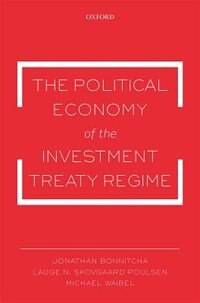The Political Economy of the Investment Treaty Regime
Jonathan Bonnitcha & al.
Éditeur : OXFORD UNIVERSITY PRESS
ISBN papier: 9780198719557
Parution : 2017
Code produit : 1358467
Catégorisation :
Livres /
Gestion /
Économie /
Économie internationale
Formats disponibles
| Format | Qté. disp. | Prix* | Commander |
|---|---|---|---|
| Livre papier | En rupture de stock** |
Prix membre : 41,80 $ Prix non-membre : 44,00 $ |
*Les prix sont en dollars canadien. Taxes et frais de livraison en sus.
**Ce produits est en rupture de stock mais sera expédié dès qu'ils sera disponible.
Description
Investment treaties are some of the most controversial but least understood instruments of global economic governance. Public interest in international investment arbitration is growing and some developed and developing countries are beginning to revisit their investment treaty policies. The Political Economy of the Investment Treaty Regime synthesises and advances the growing literature on this subject by integrating legal, economic, and political perspectives. Based on an analysis of the substantive and procedural rights conferred by investment treaties, it asks four basic questions. What are the costs and benefits of investment treaties for investors, states, and other stakeholders? Why did developed and developing countries sign the treaties? Why should private arbitrators be allowed to review public regulations passed by states? And what is the relationship between the investment treaty regime and the broader regime complex that governs international investment? Through a concise, but comprehensive, analysis, this book fills in some of the many "blind spots" of academics from different disciplines, and is the first port of call for lawyers, investors, policy-makers, and stakeholders trying to make sense of these critical instruments governing investor-state relations.























